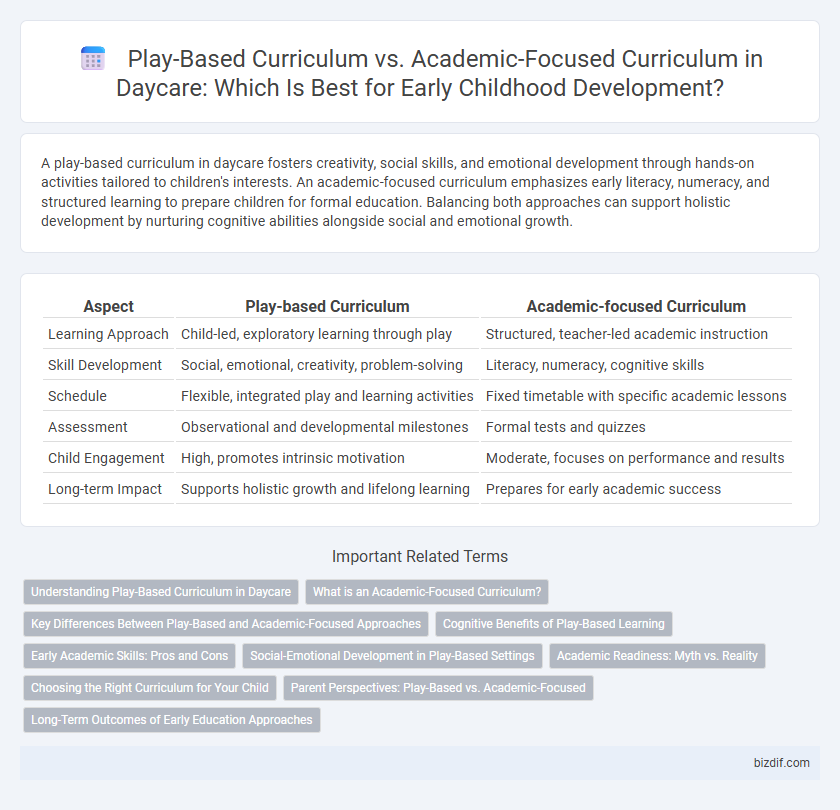A play-based curriculum in daycare fosters creativity, social skills, and emotional development through hands-on activities tailored to children's interests. An academic-focused curriculum emphasizes early literacy, numeracy, and structured learning to prepare children for formal education. Balancing both approaches can support holistic development by nurturing cognitive abilities alongside social and emotional growth.
Table of Comparison
| Aspect | Play-based Curriculum | Academic-focused Curriculum |
|---|---|---|
| Learning Approach | Child-led, exploratory learning through play | Structured, teacher-led academic instruction |
| Skill Development | Social, emotional, creativity, problem-solving | Literacy, numeracy, cognitive skills |
| Schedule | Flexible, integrated play and learning activities | Fixed timetable with specific academic lessons |
| Assessment | Observational and developmental milestones | Formal tests and quizzes |
| Child Engagement | High, promotes intrinsic motivation | Moderate, focuses on performance and results |
| Long-term Impact | Supports holistic growth and lifelong learning | Prepares for early academic success |
Understanding Play-Based Curriculum in Daycare
A play-based curriculum in daycare centers emphasizes child-led exploration and hands-on activities that foster social, emotional, cognitive, and physical development. This approach relies on purposeful play to build critical skills such as problem-solving, creativity, and communication, contrasting with the structured lesson plans of academic-focused curricula. Research shows that play-based learning supports holistic growth and engagement, laying a strong foundation for lifelong learning in early childhood settings.
What is an Academic-Focused Curriculum?
An academic-focused curriculum in daycare centers emphasizes structured learning activities designed to develop early literacy, numeracy, and cognitive skills through formal instruction and assessments. It prioritizes measurable educational outcomes, preparing children for school readiness by introducing subjects like reading, math, and science in a systematic manner. This approach contrasts with play-based methods by focusing more on teacher-led lessons and less on spontaneous exploration.
Key Differences Between Play-Based and Academic-Focused Approaches
Play-based curriculum emphasizes child-led exploration, creativity, and social development through hands-on activities, while academic-focused curriculum prioritizes structured learning goals, early literacy, and numeracy skills. Play-based programs foster cognitive and emotional growth by integrating play into learning, contrasting with academic approaches that often rely on direct instruction and assessments. Understanding these key differences helps parents and educators balance developmental needs with academic readiness in daycare settings.
Cognitive Benefits of Play-Based Learning
Play-based curriculum enhances cognitive development by fostering critical thinking, problem-solving, and creativity through interactive and sensory-rich activities. Unlike academic-focused curriculum, play-based learning promotes executive function skills such as memory, attention control, and flexible thinking essential for lifelong learning. Research shows children engaged in play-based environments demonstrate stronger cognitive flexibility and higher academic achievement over time.
Early Academic Skills: Pros and Cons
Play-based curriculum fosters early academic skills through hands-on learning, promoting creativity, social interaction, and problem-solving abilities critical in early childhood development. Academic-focused curriculum emphasizes structured learning of literacy and numeracy, potentially accelerating foundational knowledge but risking reduced engagement and increased stress among young children. Balancing playful exploration with targeted academic instruction enhances early cognitive growth while maintaining motivation and emotional well-being.
Social-Emotional Development in Play-Based Settings
Play-based curriculum in daycare centers prioritizes social-emotional development by encouraging cooperative play, empathy, and communication skills among children. This approach fosters a natural learning environment where children build self-regulation and conflict resolution abilities through interactive activities. In contrast, academic-focused curriculum often emphasizes structured tasks, which may limit opportunities for spontaneous social interaction crucial for emotional growth.
Academic Readiness: Myth vs. Reality
Play-based curriculum fosters cognitive, social, and emotional skills through hands-on activities, debunking the myth that academic-focused curriculum alone ensures academic readiness. Research shows that children engaged in play develop critical thinking, problem-solving, and language abilities essential for school success. Exclusive emphasis on formal academics can hinder creativity and motivation, making balanced play crucial for holistic early development.
Choosing the Right Curriculum for Your Child
Selecting the right curriculum for your child depends on their unique developmental needs and learning style, with play-based curriculums fostering creativity, social skills, and emotional growth through hands-on activities, while academic-focused curriculums emphasize structured learning and early literacy and numeracy skills. Research highlights that play-based learning promotes cognitive flexibility and problem-solving abilities, which are critical for long-term academic success. Parents should consider balancing both approaches by choosing daycare programs that integrate play with foundational academics to support holistic child development.
Parent Perspectives: Play-Based vs. Academic-Focused
Parents valuing a play-based curriculum often highlight its role in fostering creativity, social skills, and emotional development through hands-on activities and imaginative play. Those favoring an academic-focused curriculum prioritize early literacy, numeracy, and structured learning to prepare children for formal schooling. Surveys indicate a growing preference for play-based approaches, with many parents recognizing the balance of foundational skills with a child-centered environment.
Long-Term Outcomes of Early Education Approaches
Play-based curriculum fosters social-emotional skills, creativity, and problem-solving abilities, which research links to improved academic achievement and mental health in later years. Academic-focused curriculum emphasizes early literacy and numeracy, often resulting in short-term gains on standardized tests but potentially increasing stress and reducing motivation. Long-term outcomes suggest that balanced play-based approaches better support cognitive development, resilience, and lifelong learning habits essential for success.
Play-based Curriculum vs Academic-focused Curriculum Infographic

 bizdif.com
bizdif.com